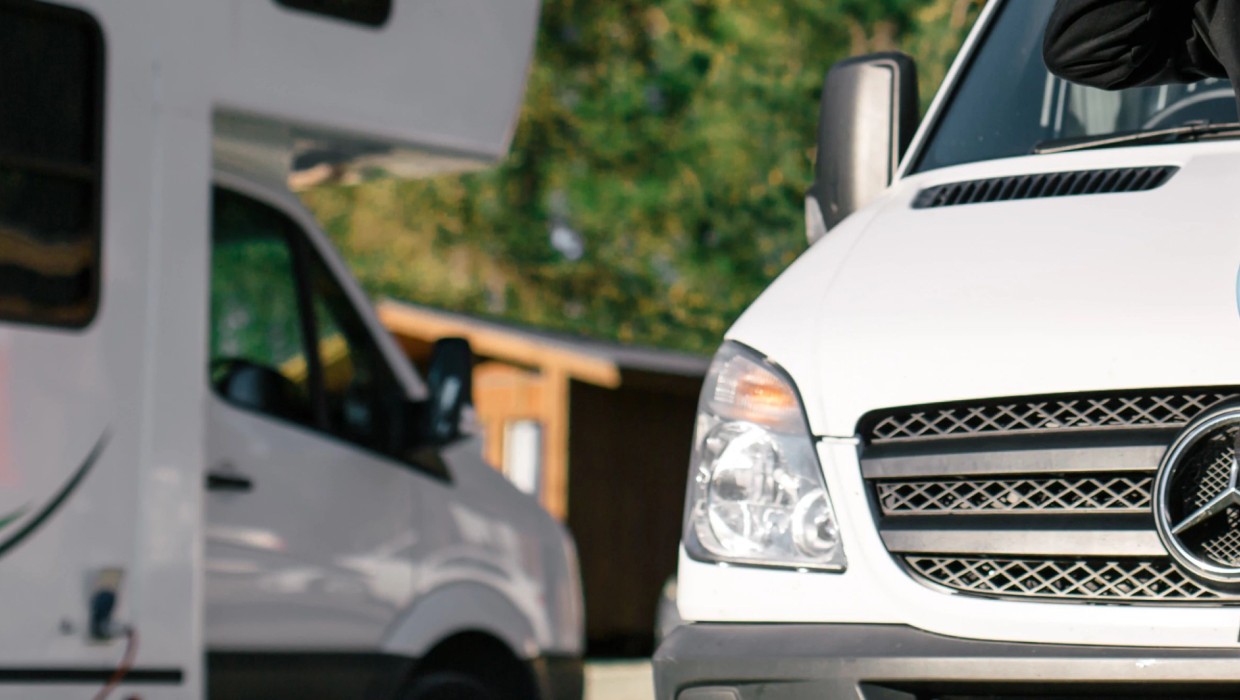Tips To Extend The Life Of RV Batteries
Author: Your RV Good Guide Date Posted: 12 January 2023

Your motorhome’s 12V battery is a big investment. Whether you use a lithium-ion battery, an AGM battery, or any other type of deep-cycle battery, it’s worth knowing how to look after it. That way, it lasts as long as possible.
If you’ve been wondering ‘how can I make my RV batteries last longer?’, or ‘how do I keep my RV battery healthy?’ – we’ve got you covered. In this blog, we’ll talk through 10 simple tips on how you can ensure your RV battery stays healthy and goes the distance.
1. Charge your battery to the right amount
One of the most important steps in maintaining your battery is to charge it up regularly. It’s important to avoid letting your 12V battery discharge below 12 volts. A fully charged battery is actually 12.7 volts, so when it reads below 12 volts, it is actually at or below a 50% state of charge. This can result in sulfation – where small crystals start to form on the plate and ruin your battery.
To ensure your battery is always well charged, it's a good idea to invest in a battery charger. RV Super Centre stocks a trusted range of chargers from brands such as Enerdrive, Powertech, Schumacher, Dometic, Power Train, Sterling, and CTEK.
2. Run your fridge on gas if you can
Many RV fridges are known as ‘three way’. This means they can run on three sources of power: LPG gas, 12V power, and AC power from an inverter. A good way to save your battery power is to only use it for running your fridge when you are driving. If you have the option of using LPG, we recommend using it for your fridge and as many appliances as you can rather than your battery. This not only means your battery charge will last, but the battery itself will have a longer life.
3. Plug into mains when possible
Plugging into a 240V mains power point at a campground when possible is a good way to reduce the drain on your battery. Not only does the 240-volt system charge up your house battery, but you’ll have use of the campground’s facilities too. Most holiday parks and campgrounds have good kitchen facilities, TV rooms, and power points to use your hair dryer, etc.
4. Disconnect your battery when not in use
Deep cycle batteries are often using power quietly in the background, even when you’re not using your RV. Equipment like electric clocks, any cords that are plugged in, and appliance circuit boards all use up power.
If you know that your RV is going to be parked up for a few days, turn your battery’s disconnect switch to ‘off’’ or unplug it. That way, it gets a rest. In the long run, this will help the battery last longer.
Note, if you have a solar panel and turn off the battery then you also turn off any charge going into the battery. So, it’s a good idea to make sure your battery is fully charged first.
5. Choose the best possible battery to begin with
Not all RV batteries are created equal, and in most cases, you get what you pay for. For example, lithium-ion batteries have a significantly longer lifecycle (the number of complete charge and discharge cycles the battery can complete before it starts to lose performance). You should be able to expect a lithium battery to last 4-6 times longer than an AGM battery. However, this depends on how well you maintain and care for the battery (it is important to keep it at the appropriate conditions as temperature and a higher discharge than recommended could impact performance or shorten battery life). The downside is that lithium batteries are more expensive to buy upfront. But if your budget allows it, the savings will add up over the long run.
6. Limit your inverter use
Inverters can also be hard on batteries because you lose energy in the process of converting from 12V to 240V. It’s a good idea to turn it off when you don’t need it.
If you’re driving and you want to run your inverter to keep appliances running (such as your slow cooker, for example) then that’s no problem. Your battery is charging from the engine alternator, so there is no charge loss. And if you’re plugged into a campground’s mains, you’ll also be fine. But when you’re parked up and off-grid, use your inverter only as needed.
7. Use a generator for power-sucking items
Appliances that generate heat, such as hair dryers, toasters, and heaters tend to draw significantly more power than other appliances. And the more output your battery expends, the shorter its life will be. If you use these sorts of appliances regularly, it may be a good idea to invest in a generator. RV Super Centre has a wide range of quality brand generators, including the Silent Wind Generators, which are eco-friendly and emit minimal noise. Our other popular brands include Dometic, Camec, GT Power, Engel and Powertec.
8. Install a digital energy metre

Knowing how much charge your battery has left is impossible without a battery gauge. You can’t tell by simply looking! It’s a good idea to invest in a digital energy metre such as the Voltronic LCD battery computer that can provide you with information about your battery’s data. This clever device is compatible with AGM, lead acid, lithium, and gel batteries. It can tell you the charging and discharging currents and the status of your battery.
Another good option is to look for a lithium battery that includes a battery management system (BMS) with Bluetooth capability. This allows you to easily monitor battery capacity, voltage, current, state of charge, and more. Having Bluetooth means you don’t have to worry about connecting to your battery with cables to check it. All you have to do is connect wirelessly with your phone to instantly check its important vitals. RV Super Centre has a wide range of 12V lithium batteries that include this functionality, including the Enerdrive B-TEC G2 and the AA Champion Smart Battery.
9. Regularly maintain your battery
There are a number of ways you may need to maintain your deep-cycle battery, depending on the type. Here are a few pointers:
Many batteries will require regular cleaning of the terminals to avoid rust and sulfation.
If your RV is out of action during winter, take your battery out and store it in a place that’s not too hot or cold. It’s worth noting that you may still need to charge it occasionally, even when not in use. If your battery is out of action for too long, it may lose its charge completely and die.
Flooded lead acid batteries require you to top up the water from time to time to avoid damage, especially when in heavy use or if it’s very hot or cold outside. Be sure to use mineral-free water - distilled water is best. Regular tap water can cause calcium sulfation. Note, add water to your battery after charging. However, if the plates are exposed prior to charging, add enough water to cover the plates and then charge the battery. Once the battery is fully charged, fill each cell to the bottom of the vent well.
You’ll also want to give cables and hold-downs a clean sometimes, too. That way, you’ll avoid corrosion over time.
TOP TIP: Remember to wear gloves, eye protection, and a face mask and ensure you have good ventilation when working with batteries. Many common batteries contain toxic materials!
10. Go solar
Generally, the more use your battery gets, the shorter its life will be. Installing solar panels on your RV is a great way to reduce some of the work your battery has to do.
Solar power takes the sun's energy and converts it into DC (Direct Current) battery power to charge your motorhome’s batteries. It’s like having a battery charger that works anytime the sun is out! Solar will also charge and maintain your battery both on and off the road, ensuring a healthy and long battery life.
RV Super Centre has a full range of solar panels, including fixed, flexible, and portable panels ranging in size from 80W to 390W. We also have all the solar accessories you need to get set up, including controllers, mounting kits, and inverters.
Think it’s time to buy a new RV battery?
If your RV deep cycle battery is showing signs of poor health, has corrosion, or is coming to the end of its lifespan, it is a good time to invest in a new one. And because you’ve read our handy tips on extending its life, you’ll be able to get the most value out of whichever battery you buy.
RV Super Centre has a wide range of 12V RV batteries, including AGM batteries, lead acid, gel batteries, and lithium-ion batteries. If you’re unsure about which battery is right for you, the good news is that the team at your local RV Super Centre can help. There’s an expert on hand at each of our stores throughout New Zealand who can ask you all the right questions to find the best battery for you. We can also install your battery to ensure it is running optimally and safely.
For more advice on batteries, check out our other helpful guides:
- Types of batteries explained
- Lithium batteries vs AGM batteries - which is best
- What size battery you need for your camper








